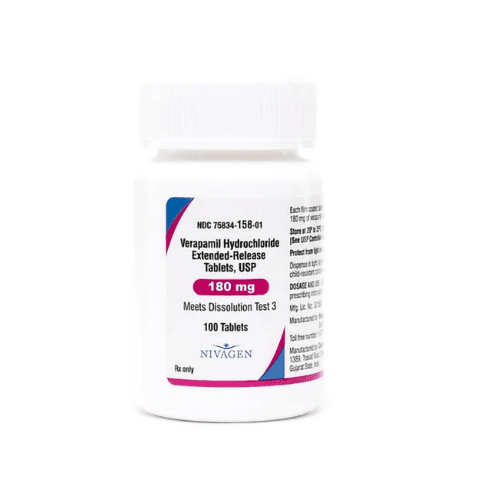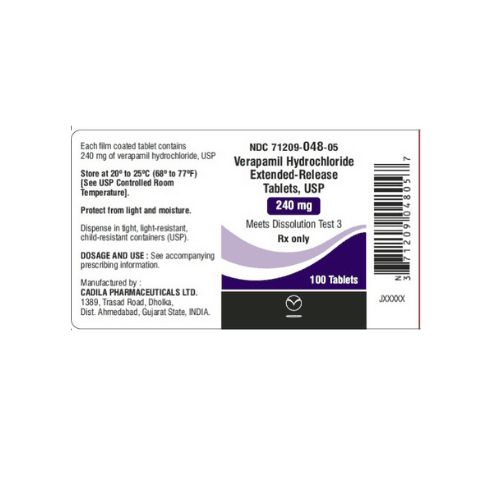Shipping with this method takes 3-5 days
Verapamil Tablets for Hypertension
Price range: $81.99 through $261.99
Secure Encrypted Payments
Verapamil is a calcium channel blocker used for high blood pressure, angina, and certain heart rhythm problems. This page explains how it works, who it suits, and how to take it safely. You can also check verapamil price and compare options with US delivery from Canada without insurance.
What Verapamil Is and How It Works
Verapamil® blocks L-type calcium channels in the heart and blood vessel walls. It lowers blood pressure by relaxing arteries and reduces the heart’s workload. It also slows conduction through the AV node, which can help control certain supraventricular arrhythmias. Effects vary by dose and formulation. Always follow your prescription label.
YouDrugstore is a licensed Canadian pharmacy in Manitoba. Pharmacists review prescriptions before dispensing.
This medicine is used for hypertension, chronic stable angina, and rate control in some supraventricular tachycardias. It may be prescribed alone or with other heart medicines. Avoid grapefruit and grapefruit juice, which can change levels of this treatment.
For related reading, explore Hypertension, Angina, and Atrial Fibrillation. You can also review lifestyle guidance in How To Treat Hypertension.
Who It’s For
This treatment is for adults diagnosed with hypertension, chronic angina, or certain supraventricular tachycardias. It may also help with rate control in atrial fibrillation when appropriate. People with severe left ventricular dysfunction, second- or third-degree AV block (unless paced), sick sinus syndrome, or cardiogenic shock should not use it. Those with heart failure, liver impairment, or a history of low blood pressure need careful evaluation by a prescriber.
Dosage and Usage
Follow your prescriber’s directions and the official label for your specific product. Immediate-release tablets are usually taken multiple times per day with food or shortly after meals. Extended-release products are taken once daily or twice daily depending on brand and formulation. Swallow extended-release tablets or capsules whole; do not crush or chew.
Take doses at the same times each day. If you also take other heart medicines, your prescriber may adjust timing to reduce interactions. Avoid alcohol excess, which may worsen dizziness. Do not stop this therapy suddenly without medical guidance; blood pressure or chest pain may worsen.
Strengths and Forms
Common presentations include immediate-release tablets and extended-release tablets or capsules. Typical tablet strengths and modified-release strengths are widely available; specific availability may vary by supplier and region. Many users compare verapamil ER 240 mg price when considering once-daily options.
Ask your healthcare professional which formulation suits your condition and schedule. For broader condition support, see Supraventricular Tachycardia and our Cardiovascular category.
Missed Dose and Timing
If you miss a dose, take it when you remember unless it is close to the next dose. If it is close, skip the missed dose and return to your regular schedule. Do not double up. For extended-release products, stay consistent with timing to keep levels steady. If vomiting occurs soon after a dose, do not repeat unless your prescriber instructs you.
Storage and Travel Basics
Store tablets in the original container, tightly closed, and away from moisture and heat. Keep out of reach of children and pets. When traveling, carry this medicine in your hand luggage with a copy of your prescription. Use a daily organizer only if it closes securely and labels remain clear. Avoid storing in bathrooms or hot cars. If you cross time zones, keep intervals roughly consistent and ask your clinician for planning help.
Benefits
This therapy can help reduce blood pressure and ease angina symptoms by lowering oxygen demand and relaxing vessels. It may improve exercise tolerance for some patients with stable angina. For those using sustained-release options, verapamil SR price is often weighed against once-daily convenience and steady control. Many people value flexible dosing across immediate-release and extended-release products.
Side Effects and Safety
- Common effects: constipation, dizziness, headache
- Other effects: nausea, fatigue, edema, flushing
- Less common: low blood pressure, slow heart rate
Serious or rare reactions can include significant bradycardia, AV block, worsening heart failure, liver enzyme elevations, or severe hypotension. Seek urgent care for fainting, severe dizziness, shortness of breath, or swelling that worsens. Risk of low blood pressure or slow pulse increases with beta-blockers or in those with existing conduction issues. Report persistent constipation; your prescriber may suggest dietary changes or adjustments.
Drug Interactions and Cautions
Important interactions include beta-blockers, digoxin, and other agents that slow conduction, which can compound heart-rate effects. Strong CYP3A4 inhibitors (such as certain azole antifungals, macrolides, or protease inhibitors) can increase levels. CYP3A4 inducers (like rifampin or some anticonvulsants) can lower levels. Certain statins metabolized by CYP3A4 may require caution. Alcohol can enhance blood pressure–lowering effects. Review all medicines and supplements with your healthcare professional.
What to Expect Over Time
Blood pressure reductions may emerge with consistent daily use. Angina relief depends on dose, adherence, and activity level. Rate control for rhythm issues may require careful titration and monitoring. Routine follow-up may include blood pressure logs, heart rate checks, and periodic ECGs. If your symptoms persist or new ones appear, contact your prescriber. Keep lifestyle measures in place, including a heart-healthy diet, activity as advised, and limiting sodium and alcohol.
Compare With Alternatives
Other calcium channel blockers or beta-blockers may be considered when appropriate. Your prescriber may suggest an alternative such as Diltiazem or an option like Metoprolol Sr depending on your history and treatment goals.
Pricing and Access
Canadian pharmacy pricing can help reduce out-of-pocket spend for many patients. You can review verapamil tablets price on each product page and compare package sizes before adding to cart. We also list generic verapamil price to help you choose a cost-effective option for your prescription. For broader heart health reading, see World Heart Day 2025. We offer US shipping from Canada, and your prescription is required and verified.
Availability and Substitutions
Stock may vary by strength and dosage form. If a particular version is unavailable, your prescriber may recommend a suitable alternative formulation or a different agent in the same class. The price of verapamil can differ between immediate-release and modified-release products. Do not switch forms without guidance, as dosing and timing are not interchangeable.
Patient Suitability and Cost-Saving Tips
This medicine may suit adults who need blood pressure control, angina management, or rate control for certain arrhythmias, and who do not have specific conduction problems or severe heart failure. It may not suit those with significant bradycardia, advanced AV block without a pacemaker, or low baseline blood pressure. Some patients compare verapamil 120 mg price with other strengths when planning multi-month fills. Consider 60- or 90-day supplies if appropriate, set refill reminders, and keep all follow-up appointments.
Questions to Ask Your Clinician
- Goal of therapy: blood pressure, angina control, or rhythm rate
- Form choice: immediate-release vs extended-release
- Food effects: best timing with meals
- Interaction risks: other heart medicines or supplements
- Monitoring: home blood pressure and heart rate
- When to escalate: persistent chest pain or dizziness
Authoritative Sources
See official information for full prescribing details and safety:
Ready to proceed? You can place your order with express shipping, temperature-controlled handling when required, and clear tracking.
This guide is for general information and does not replace advice from your healthcare professional.
Express Shipping - from $25.00
Prices:
- Dry-Packed Products $25.00
- Cold-Packed Products $35.00
Shipping Countries:
- United States (all contiguous states**)
- Worldwide (excludes some countries***)
Standard Shipping - $15.00
Shipping with this method takes 5-10 days
Prices:
- Dry-Packed Products $15.00
- Not available for Cold-Packed products
Shipping Countries:
- United States (all contiguous states**)
- Worldwide (excludes some countries***)
What conditions does verapamil treat?
Verapamil is a calcium channel blocker used to treat high blood pressure, chronic stable or variant angina, and certain supraventricular arrhythmias. It can help lower blood pressure by relaxing arteries and reduce the heart’s workload. For rhythm issues, it slows conduction through the AV node, which can aid rate control. Your prescriber will decide the best formulation and dose for your specific condition and overall health history.
How should I take verapamil tablets?
Take verapamil exactly as directed on your prescription label. Immediate-release tablets are usually taken more than once daily, preferably with food. Extended-release products are typically taken once daily or as directed. Swallow extended-release tablets whole without crushing or chewing. Try to take doses at the same times each day and avoid grapefruit products. If instructions are unclear, consult your healthcare professional or pharmacist.
What side effects are common with verapamil?
Common side effects include constipation, dizziness, headache, flushing, and mild swelling. Some people experience fatigue or nausea. Rare but serious effects can include very low blood pressure, slow heart rate, AV block, or worsening heart failure. Contact a clinician urgently for fainting, shortness of breath, or swelling that worsens. Your overall risk depends on dose, other medicines you take, and your health status.
Can verapamil be taken with beta-blockers or digoxin?
Caution is needed when combining verapamil with beta-blockers or digoxin. These medicines can add to the slowing of heart rate and conduction, increasing the risk of bradycardia or AV block. Your prescriber may monitor heart rate and ECG more closely and adjust therapy if needed. Always provide a full list of medicines and supplements so potential interactions can be reviewed before starting or changing treatments.
What should I do if I miss a dose of verapamil?
If you miss a dose, take it when you remember unless the next dose is due soon. If it is close to your next scheduled dose, skip the missed one and resume your usual timing. Do not take two doses at once. For extended-release forms, try to maintain consistent daily timing to keep levels steady. If you have frequent missed doses, ask your pharmacist for adherence tips like pill organizers or reminders.
How should I store verapamil during travel?
Keep tablets in the original labeled container and carry them in your hand luggage. Protect from moisture and excessive heat. Use a secure pill organizer only if you can keep labels and dosing clear. When crossing time zones, keep intervals consistent and consult your clinician for a practical schedule. Always bring your prescription or a copy of it, and do not store medicine in a bathroom or a hot car.
When might verapamil not be appropriate?
It may be unsuitable for people with certain conduction problems such as second- or third-degree AV block without a pacemaker, sick sinus syndrome, or those in cardiogenic shock. Caution is needed in heart failure, low baseline blood pressure, or liver impairment. Your prescriber will consider your medical history, other medicines, and treatment goals before recommending this option or suggesting an alternative in the same class.

